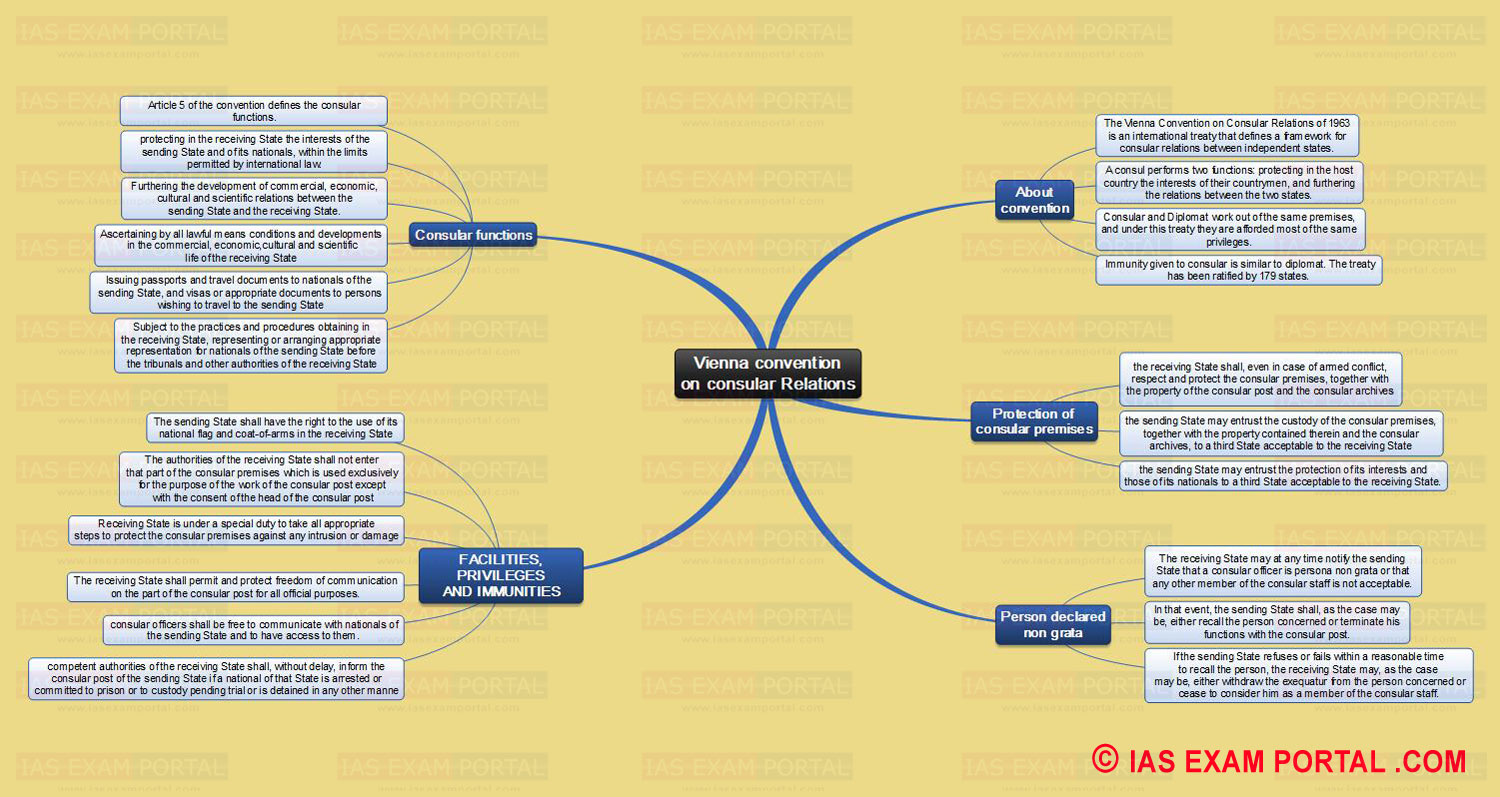Vienna Convention on Consular Relations : Mind Map for UPSC Exam
Vienna convention on consular Relations : Mind Map for UPSC Exam
Study Material for IAS Prelims: GS Paper -1 + CSAT Paper-2
Online Crash Course for UPSC PRE Exam
1.1. About convention
-
The Vienna Convention on Consular Relations of 1963 is an international treaty that defines a framework for consular relations between independent states.
-
A consul performs two functions: protecting in the host country the interests of their countrymen, and furthering the relations between the two states.
-
Consular and Diplomat work out of the same premises, and under this treaty they are afforded most of the same privileges.
-
Immunity given to consular is similar to diplomat. The treaty has been ratified by 179 states.
1.2. Protection of consular premises
-
the receiving State shall, even in case of armed conflict, respect and protect the consular premises, together with the property of the consular post and the consular archives
-
the sending State may entrust the custody of the consular premises, together with the property contained therein and the consular archives, to a third State acceptable to the receiving State
-
the sending State may entrust the protection of its interests and those of its nationals to a third State acceptable to the receiving State.
1.3. Person declared non grata
-
The receiving State may at any time notify the sending State that a consular officer is persona non grata or that any other member of the consular staff is not acceptable.
-
In that event, the sending State shall, as the case may be, either recall the person concerned or terminate his functions with the consular post.
-
If the sending State refuses or fails within a reasonable time to recall the person, the receiving State may, as the case may be, either withdraw the exequatur from the person concerned or cease to consider him as a member of the consular staff.
1.4. Consular functions
-
Article 5 of the convention defines the consular functions.
-
protecting in the receiving State the interests of the sending State and of its nationals, within the limits permitted by international law.
-
Furthering the development of commercial, economic, cultural and scientific relations between the sending State and the receiving State.
-
Ascertaining by all lawful means conditions and developments in the commercial, economic,cultural and scientific life of the receiving State
-
Issuing passports and travel documents to nationals of the sending State, and visas or appropriate documents to persons wishing to travel to the sending State
-
Subject to the practices and procedures obtaining in the receiving State, representing or arranging appropriate representation for nationals of the sending State before the tribunals and other authorities of the receiving State
1.5. FACILITIES, PRIVILEGES AND IMMUNITIES
-
The sending State shall have the right to the use of its national flag and coat-of-arms in the receiving State
-
The authorities of the receiving State shall not enter that part of the consular premises which is used exclusively for the purpose of the work of the consular post exceptwith the consent of the head of the consular post
-
Receiving State is under a special duty to take all appropriate steps to protect the consular premises against any intrusion or damage
-
The receiving State shall permit and protect freedom of communication on the part of the consular post for all official purposes.
-
consular officers shall be free to communicate with nationals of the sending State and to have access to them.
-
competent authorities of the receiving State shall, without delay, inform the consular post of the sending State if a national of that State is arrested or committed to prison or to custody pending trial or is detained in any other manner.

